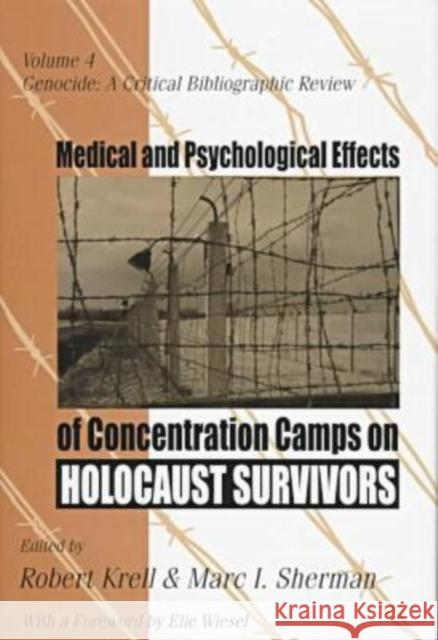Medical and Psychological Effects of Concentration Camps on Holocaust Survivors: Genocide: A Critical Bibliographic Review » książka
Medical and Psychological Effects of Concentration Camps on Holocaust Survivors: Genocide: A Critical Bibliographic Review
ISBN-13: 9781560002901 / Angielski / Twarda / 1997 / 365 str.
Medical and Psychological Effects of Concentration Camps on Holocaust Survivors: Genocide: A Critical Bibliographic Review
ISBN-13: 9781560002901 / Angielski / Twarda / 1997 / 365 str.
(netto: 622,01 VAT: 5%)
Najniższa cena z 30 dni: 651,77
ok. 22 dni roboczych
Bez gwarancji dostawy przed świętami
Darmowa dostawa!
This unique research bibliography is offered in honor of Leo Eitinger of Oslo, Norway. Dr. Eitinger fled to Norway in 1939, at the start of the World War II. He was caught and deported to Auschwitz, where, among others, he operated on Elie Wiesel who has written the foreword to this volume. After the war, Eitinger became a pioneering researcher on a subject from which many shied away. His contributions to understanding of the experience of massive psychological trauma have inspired others to do similar work. His many books and papers are listed in this special volume of the acclaimed bibliographic series edited by Israel W. Charny of The Institute on the Holocaust and Genocide in Jerusalem.In order to acquaint users of this bibliography with the topic, two introductory articles are offered. The first is titled "Survivors and Their Families" and deals with the impact of the Holocaust on individuals. The second, "Psychiatry and the Holocaust," examines the general impact of the Holocaust on the field of psychiatry. Robert Krell writes that in general the psychiatric literature has reflected critically on the survivor due to preconceived notions held by many mental health professionals. For many years, the exploration of victims' psychopathology obscured the remarkable adaptation made by some survivors. The problems experienced by survivors and possible approaches to treatment were entirely absent from mainstream psychiatric textbooks such as the Comprehensive Textbook of Psychiatry throughout the 1960s and 1970s.Fifty years of observations about survivors of the concentration camps and other survivors of the Holocaust (in hiding, as partisans, in slave labor camps) has provided a new body of medical and psychiatric literature. This comprehensive bibliography contains a plethora of references to significant pieces of literature regarding the Holocaust and its effects on survivors. It will be of inestimable value to physicians, psychiatrists, psychologists, and social workers, along with historians, sociologists, and Holocaust studies specialists.











